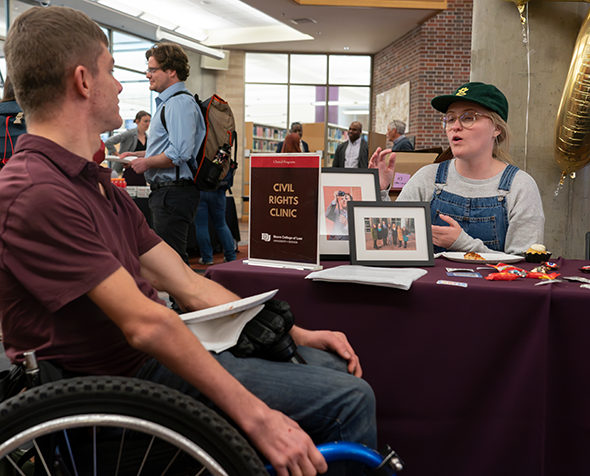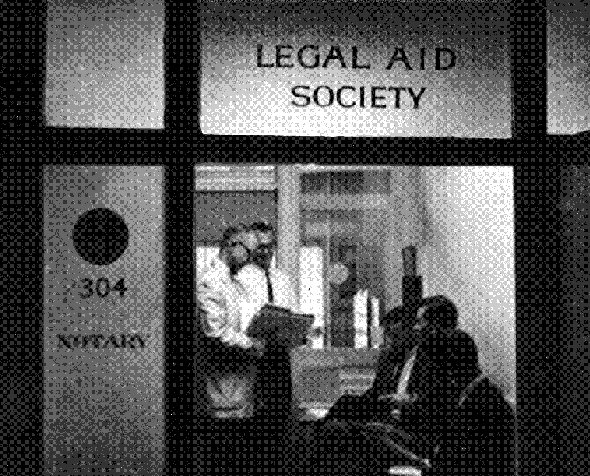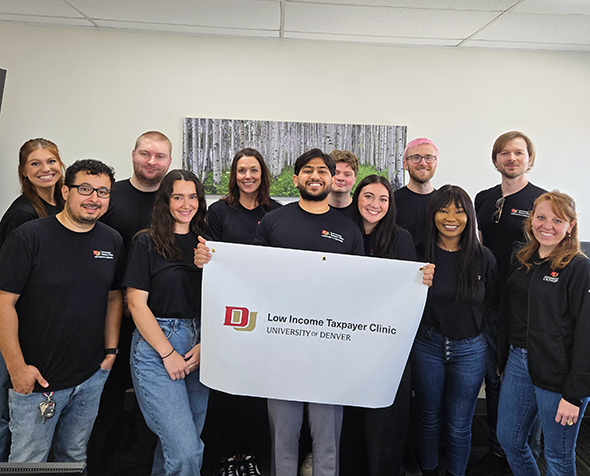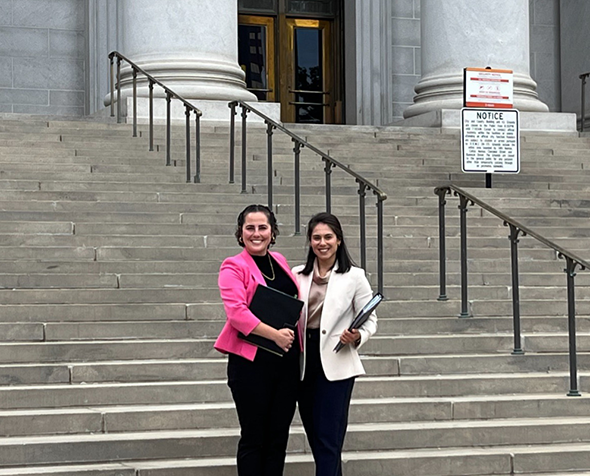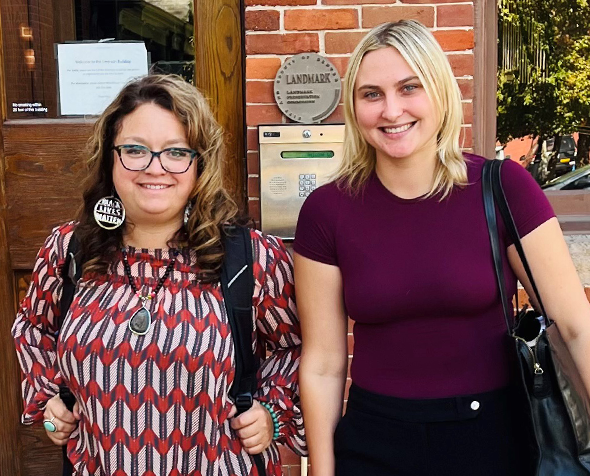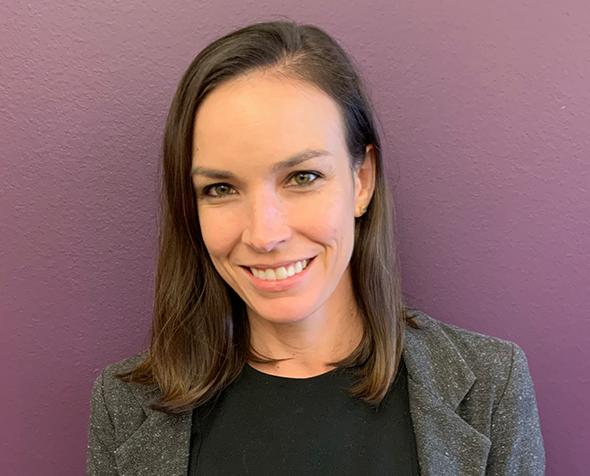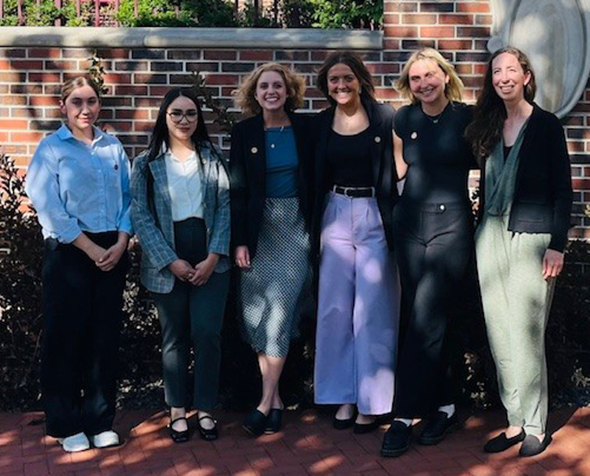Clinical Programs: Student Law Office
Clinical legal education is a vital component of law school curricula, and Denver Law has been at the forefront since 1904, when we founded the first legal aid dispensary in the nation. We have provided innovative, hands-on legal education to our students ever since.
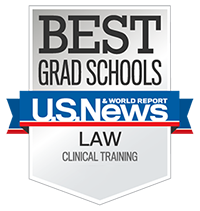
Ranked #8 by U.S. News & World Report, Denver Law's Student Law Office (SLO), our in-house clinical program, offers students the opportunity to engage in the practice of law while empowering underrepresented individuals and communities. As a working law firm within the law school, the SLO houses seven clinics: Advancing Social Change, Civil Litigation, Civil Rights, Community Economic Development, Immigration Law & Policy, Criminal Defense, and Environmental Law. These clinics train student-attorneys to become highly competent and ethical lawyers through real-life client representation. SLO faculty advise and monitor cases and projects through closure, but in the SLO the students have the primary responsibility for their clients. All of our clinics provide legal assistance to populations that often lack access to representation.
In addition to the Student Law Office, students at Denver Law can engage in the practice of law through our Legal Externship Program, as well as live-client courses outside of the Student Law Office, including the Low-Income Taxpayer Clinic, the Tribal Wills Project, and the Animal Activist Legal Defense Project.
Follow us on Instagram!
- Information for Students Applying to the SLO
- Request Legal Services / Solicitar Servicios Legales
- Christopher N. Lasch Clinical Teaching Program
- Clinic News and Highlights
- Donate to the Student Law Office
Know Your Rights! Immigrants Rights Information / Conoce tus Derechos! Información Sobre los Derechos de los Inmigrantes
Download File
Information for Students Applying to the SLO
Student Law Office Clinics
FAQs - Student Law Office
-
What are the benefits of participating in the Student Law Office?
Clinical legal education is a vital component of every law school’s curriculum. At the University of Denver, the Student Law Office (SLO) offers seven in-house clinics: Advancing Social Change, Criminal Defense, Civil Litigation, Civil Rights, Community Economic Development, Environmental Law, and Immigration Law and Policy.
These clinics provide students with diverse opportunities to develop essential legal skills, including pretrial, trial, and transactional practices. Students engage in interviewing and counseling clients, developing case strategies, conducting investigations, managing discovery, negotiating with opposing parties, mediating settlements, and litigating disputes. They also draft contracts, bylaws, articles of incorporation, and other key documents.
In addition to practical skills, students learn legal ethics, confidentiality principles, and how to navigate the complexities of being law advocates. The SLO places a strong emphasis on case management, equipping students to handle their cases effectively and efficiently. Through this work, students also cultivate empathy and sensitivity toward the challenges faced by underserved clients, preparing our student attorneys for impactful legal careers.
Participating in a law clinic before graduation provides students with hands-on experience handling real cases under the guidance of law professors. Through regular supervision sessions, students receive constructive feedback and engage in collaborative discussions, sharpening their skills and deepening their understanding of legal practice. This invaluable experience equips students with a strong foundation of critical skills, preparing them for a smooth transition into their first full-time legal positions after graduation.
-
What are the requirements for participating in a Student Law Office Clinic?
To participate in a law clinic, students must have completed 30 academic credit hours by the start of the clinic (meaning that you have completed the entirety of your 1L required courses by the start of the clinic). Students must also have a GPA of 2.3 or higher. Some clinics may have additional pre- or co- requisites based on the nature of the work, so be sure to review the individual clinic flyers and websites to confirm you meet all requirements before applying.
Students must also complete the application process, which includes completing our online application form as well as a conflict-of-interest check. Clinic professors usually conduct interviews with prospective students as well.
-
When can I apply for a position in a Student Law Office Clinic?
Students who have completed 30 academic credit hours by the start of the clinic are eligible to apply for all the clinics in the Student Law Office (see requirements question above).
Application Information for Fall 2025: Clinic applications for Academic Year 2025–2026 year-long clinics and Fall 2025 semester-long clinics will be open from 9:00 a.m. on Monday, March 3, 2025, through 11:59 p.m. on Sunday, March 9, 2025. The link to the application will be posted on the SLO website when the application period begins. Keep an eye out for notices in Denver Law’s weekly Student Affairs newsletters, as well as information sessions and other events about the SLO and our application process.
Note: This application process is for the Student Law Office only. Students interested in the Externship Program or other live-client courses should contact those programs directly.
-
What Is the Time Commitment Expected of Students Enrolled in a Clinic in the SLO?
Each clinic in the SLO consists of three main components: the clinic seminar, case work, and supervision meetings with their professors and colleagues. This means that student attorneys will attend clinic seminar classes and meet regularly with their case team and professor(s), in addition to undertaking the work necessary to provide excellent representation to their clients and/or clinic partners.
Engaging in a clinic is therefore a time-intensive, but highly rewarding, experience. The minimum number of hours that students can expect to work on clinic matters each week varies by clinic (please check the clinics you are considering), but all students should be prepared to devote significant time to their clinic work. For most clinics, students can expect to spend a minimum of 20-25 hours per week working on SLO matters (including casework, supervision, classes and preparation). The exact amount of time will vary from week to week and may require substantially more time in some weeks. It’s important to plan your schedule around these obligations.
-
How Many Credits Will I Receive Through Participating in a Student Law Office Clinic?
The number of credits varies by clinic, as described below. Each clinic in the SLO carries both “in-class” credits (the credits associated with the clinic seminar) and “out-of-class” credits (the credits associated with client work and supervision). Only the “out-of-class” credits count toward the 25 total “out-of-class" credits that students may take at Denver Law.
Semester-Long Clinic Credits
- Criminal Defense Clinic: 9 total credits (4 in-class, 5 out-of-class)
- Civil Litigation Clinic: 9 total credits (4 in-class, 5 out-of-class)
- Advancing Social Change Clinic: 6 total credits (3 in-class, 3 out-of-class)
(Note: This course gives priority to qualified part-time program students at Sturm College of Law. All seminar classes meet on weekends dedicated to part-time program courses. The ASCC is usually offered once per year.)
Year-Long Clinic Credits (totals for the entirety of the year)
- Civil Rights Clinic: 18 total credits (6 in-class, 12 out-of-class)
- Community Economic Development Clinic: 12 total credits (6 in-class, 6 out-of-class)
- Environmental Law Clinic: 18 total credits (6 in-class, 12 out-of-class)
- Immigration Law and Policy Clinic: 18 total credits (8 in-class, 10 out-of-class)
-
Will I be Asked to Leave the Program if I Don't Win My Case?
No. Each clinic professor provides students with their expectations in their course, but the Student Law Office faculty does not evaluate you on the outcomes of your cases. Losing cases is a natural part of being a legal advocate. Faculty instead consider factors such as, but not limited to, the quality of assistance that you provided to your clients and/or clinic partners, how diligently and insightfully you prepared for and performed your legal work, your class preparation, and your ability to be self-reflective and thoughtful in writing reflections, classroom discussions, and in other exchanges.
-
I'm a Part-Time Student. Can I Participate in a Student Law Office Clinic?
Both full-time and part-time students who have completed the 30-credit hour requirement are encouraged to apply for all the clinics in the Student Law Office. However, to participate in a clinic, students must attend all clinic seminars, court dates, and supervision sessions as scheduled, as well as have sufficient time to effectively and thoroughly do the work required to effectively represent your client(s). If you have questions about the time commitment and obligations of a particular clinic, please reach out to the professor(s) teaching that clinic and/or attend a clinic information session or other event to learn more.
Please note that the Advancing Social Change Clinic gives priority to students in Denver Law’s Part-Time JD Program, and all the seminar classes will meet on the weekends dedicated to part-time program classes. The fieldwork hours, while intensive, can be completed at flexible times, in consultation with the professor and relevant clinic partners.
-
Does participating in a Student Law Office clinic satisfy the Public Service and Upper-Level Writing Requirements?
Participation in all the Student Law Office clinics satisfies the Public Service Requirement.
However, not all SLO clinics automatically fulfill the Upper-Level Writing (ULW) Requirement. Check your course listing to determine if the clinic in which you are interested satisfies the ULW requirement. For those clinics that do not automatically satisfy the ULW, students may end up engaging in work in the course that satisfies the ULW. If that is the case, with the permission of the student, the professor in that course will notify the Registrar’s Office that the student has completed their ULW through their work in the clinic.
-
Can I participate in the Student Law Office and an externship at the same time?
As a student attorney, you will be required to abide by the professional responsibility rules that govern all practicing lawyers. Given the intensive time commitment of clinic courses as well as the potential for ethical conflicts of interest, students are not allowed to simultaneously participate in a clinic in the Student Law Office and an externship through the Legal Externship Program or any other experiential course in the law school that involves client work.
-
Can I work and participate in the Student Law Office at the same time?
As a student attorney, you will be asked to abide by all of the ethical rules that would apply as if you were a practicing lawyer. We know that some of you will be working while also taking a clinic. While we generally discourage this, given the intensive time commitment of clinic courses, we are aware that some of you will work. If you are working while you are enrolled in a clinic in the Student Law Office, you will have to submit information regarding your employer (and, if necessary, clients or others that your employer serves) to complete a conflict check within the SLO. In addition, after discussion with your clinic supervisor and permission from your clinic client(s), you may need to disclose your clinic work to your employer, and they may need to complete a conflict check as well. If a conflict arises, within your own clinic or any clinic within the Student Law Office, there is a presumption that the conflict will be resolved to the benefit of the clinic client. Thus, in the event a conflict exists, there is a risk that you may have to withdraw from the clinic.
This same policy applies to any volunteer work undertaken by student attorneys during their enrollment in the Student Law Office. Students who work or volunteer while enrolled in a clinic must discuss these plans with the clinic professor(s) before enrolling in the clinic or, if the work or volunteer opportunity arises after the student is already enrolled in a clinic, before the employment or volunteer work commences. In addition to possible clinic-wide conflict issues, it is essential that the student and professor(s) have a meaningful discussion and reach a mutual understanding regarding the time commitment and other aspects of the proposed work or volunteer position.
-
Which Student Law Office clinics meet the experiential learning requirement for Denver Law’s JD Certificate Programs?
Participation in the following clinics satisfies the experiential learning requirement for earning a certificate in the corresponding area of law:
- Community Economic Development Clinic: Corporate & Commercial Law
- Criminal Defense Clinic: Constitutional Rights & Remedies
- Civil Rights Clinic: Constitutional Rights & Remedies
- Civil Litigation Clinic (with emphasis on employment law): Workplace Law
- Environmental Law Clinic: Environmental & Natural Resources Law
-
Contact Us
For questions about the Student Law Office, please contact the Administrative Director at Marissa.Olan@du.edu.
#8 clinical training U.S. News & World Report
1st student law clinic in the nation opened in 1904
7 clinics
How to Request Legal Services
SLO Office Hours: The Student Law Office is open
Monday - Thursday from 9 a.m. to 5 p.m.
All requests for legal services should be made through our
Request for Legal Services form below.
For all other inquiries, please call 303-871-6133 during our normal operating hours.

Potential Clients
Thank you for your interest in our services. Please use the 'Request Legal Services' button below to fill out a form that will provide us with some information about your legal needs. The Student Law Office accepts a limited number of cases in specific practice areas, and this form will help us determine if your case is an appropriate fit for student representation through the University of Denver Student Law Office.
Note: Requests for services from the Community Economic Development Clinic, Low Income Taxpayer Clinic, and Tribal Wills Project are not processed through this request form. Please submit a request directly to those organizations.
Request Legal Services Colorado Legal Resources
Gracias por su interés en nuestros servicios. Por favor, utilice el botón de 'Solicitar Servicios Legales' a continuación para completar un formulario que nos brindará información sobre sus necesidades legales. La Oficina Legal Estudiantil acepta un número limitado de casos en áreas de práctica específicas, y este formulario nos ayudará a determinar si su caso es adecuado para la representación estudiantil a través de la Oficina Legal Estudiantil de la Universidad de Denver.
Nota: Las solicitudes de servicios para el Community Economic Development Clinic, el Low Income Taxpayer Clinic y el Tribal Wills Project no se procesan a través de este formulario de solicitud. Por favor, envíe su solicitud directamente a esas organizaciones.

Christopher N. Lasch Clinical Teaching Program
The Christopher N. Lasch Clinical Teaching Program at the Sturm College of Law prepares talented and dedicated individuals to serve as future full-time clinical faculty members at U.S. law schools. Christopher N. Lasch Clinical Teaching Fellows (“Lasch Fellows”) undertake a rigorous training program involving assignment to a particular clinic within the Student Law Office and an associated three-year course of teaching, research, and study culminating in an LL.M. degree.
-
Learn More
During the course of the Program, Lasch Fellows enroll in seminars focused on clinical pedagogy and legal scholarship; supervise clinical students, first as co-supervisors with full-time clinical faculty and then on their own; assist in teaching clinical seminars; engage in client representation; and prepare one or more scholarly articles of publishable quality. Lasch Fellows receive an annual stipend and are awarded LL.M. degrees upon their successful completion of their fellowships.
Our former fellows are now teaching at law schools throughout the country — including the George Washington University Law School, University of Nebraska College of Law, University of St. Thomas School of Law, the University of Tennessee College of Law, the University of Wyoming School of Law, University of Montana School of Law, University of Connecticut School of Law, and Widener University Delaware School of Law — as well as practicing law both locally and nationally.
The Program honors the life and legacy of Professor Christopher N. Lasch (1965-2021), who served on the faculty of the Sturm College of Law for over a decade. Professor Lasch was a fierce advocate for social justice, a nurturing teacher and mentor, and a scholar of immense range and significance who took a strong and enduring interest in the training of future lawyers and clinical law teachers. The Lasch Fellowship Program is intended to create legal educators who will continue his legacy of excellence.
When we are hiring for the Lasch fellowship, the job posting can be found at https://jobs.du.edu/en-us/listing/.

History of the Student Law Office
In 1904, Dean Lucius W. Hoyt had the foresight and vision to recognize that poor and underserved communities need legal help, and that law students could provide that help while simultaneously learning important practice skills. Thus, opened as a “legal aid dispensary” in 1904, the University of Denver was the first in the nation to offer law students academic credit for representing underserved persons. Today, DU’s Student Law Office strives to create an educational atmosphere in which law students can refine their lawyering skills while providing quality representation to indigent clients.
-
Learn More
While considered unusual in 1904, clinical legal education is now a critical part of all law schools’ curricula. Today, the University of Denver’s Clinical Program includes seven in-house clinics focusing on advancing social change, criminal defense, civil litigation, civil rights, community economic development, environmental law, and immigration law and policy.
This range of clinical offerings provides students opportunities to learn many different skills including pretrial and trial and transactional. Students have the opportunity to interview and counsel clients, develop case theory, investigate and engage in discovery, negotiate with adversaries, mediate settlements and engage in the trial of disputed matters and draft contracts and bylaws, article of incorporation and more. They learn legal ethics and practice in a range of areas including issues of confidentiality and conflict of interest. The program emphasizes case management skills, enabling students to handle their cases effectively and efficiently and develop sensitivity to and empathy for the plight of underserved clients. Faculty supervisors advise and monitor cases and projects through closure, but in the SLO the students have the primary responsibility for their clients.


